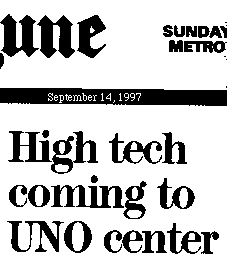
Technology?
Part of a front page article that appeared the Sunday, September 14, 1997 issue of the New Orleans' ...
Bridging the training gap
Software programs to be developed and used at the Navy personnel center are designed by Oracle Corp. of Redwood City, Calif. Oracle, an international powerhouse in the business of gathering and storing information, already has specialists working at a New Orleans Navy personnel records center on Poland Avenue. The existing facility is only a fraction of the size anticipated for UNO, since thousands of additional Navy personnel records will be added.
Oracle's lock on the Navy business means workers seeking jobs at the center will need advanced training in a specialized niche. Although some local companies have employees already schooled in Oracle technology, no such training programs are available to the public in New Orleans.

"That's one of the demands these people will have on them, to learn that product," said Robert Dupont, dean of Metropolitan College at the University of New Orleans.
UNO administrators have scrambled to begin designing Oracle training programs that will prepare workers for the high-paying new jobs in communications and software.
However, business developers who have been through similar experiences elsewhere say that retooling a work force to handle the challenges of complicated new technology can appear deceptively simple.
"It's not that easy," said Harry Martin, president of the Community Development Foundation in Tupelo, Miss.
Tupelo was a pioneer in setting up high-tech employee training programs. Since the late 1970s, the Tupelo area has attracted more than 600 domestic and foreign companies, creating thoub sands of high-tech, computer~ based jobs in the manufacturingof plastics, furniture, automobile tires, garments, glass and other products.
Based on the Tupelo experience, Martin said, New Orleans is likely to encounter difficulty in matching the traditional higher education system with the more fluid demands of teaching new technology.
"Most of the education and training people have liberal arts degrees. Few of them have technological training, and that's one of the problems we have," Martin said.
However, UNO administrators and a spokesman for Oracle Corp. are confident the Navy's need for trained workers will be met, and in fairly rapid order. Phil Garond, Oracle's industry director based in New Orleans, said the company already has established a training center for private sector customers here.
"Oracle has an extensive educational group that is geared toward training customers," Garond said. If local staffing isn't enough, he added, the company will send other training experts from around the country to help in the New Orleans effort.
Lockheed Martin Corp., the Navy's primary contractor on the software project, is equally certain that enough workers will be found. "As you develop software expertise within the region, you will attract industry and people who are interested in that kind of work," said Fred Lyssy, the Lockheed Martin vice-president who oversees work in New Orleans. "It's been our experience that there is not a large pool now," he said. So Lockheed plans to recruit outside professionals as well as train local workers. Eighty percent of the center's workforce will be civilian employees of Lockheed Martin and other companies working under contract with the Navy.
Timothy Ryan, dean of the University of New Orleans College of Business, said that in the beginning Lockheed and the Navy might have to find the bulk of workers elsewhere and bring them to New Orleans. But Ryan said a degree minor and a fouryear bachelor's degree program are being designed to qualify local graduates for the jobs. Metropolitan College is planning a flexible program to offer Oracle training at UNO centers in Slidell, Jefferson Parish and downtown New Orleans.
Back to TOP